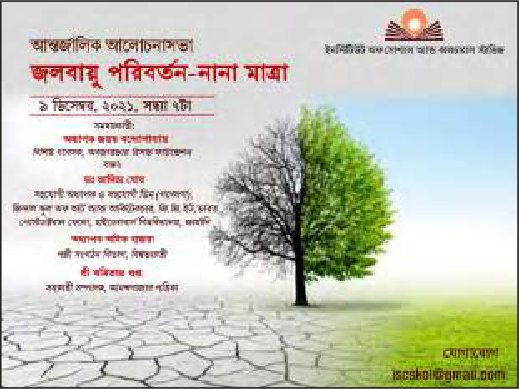Webinar on Jal Vayu Parivartan : Nanan Matra (Climate Change: Features and Impact)
- 9th December 2021
The Bangla Cell of ISCS India that brought some revisions in its structural layout in recent times and in parallel to history and nationalistic perspectives decided to also bring contemporary issues, socio- economic trends and evolving sustainability idioms into notice through arranging frequent discourses and discussions in Bangla altogether. The Initiative will not only help to appraise about policies and pragmatics in regional language, but at the same time will help the organization to connect with region’s own people contributing in multiple sectors within the country and across the continents. The Institute ensue to its objectives with the Webinar on “Jal Vayu Parivartan: Nanan Matra” to discuss about the climatic rejig’s or conversions in support of eminent national and international speakers and in virtual presence of trans-disciplinary participants. The discourse started with the remarks of the Distinguished Chair of the discourse – Prof. Jayanta Bandyopadhyay – Researcher, author and Distinguished Fellow at the Observer Research Foundation, Kolkata, who helped participants to clear up about the concept of Climate Change, global warming and how the thickening of the terrace of gases in our environ are the root cause of climatic uncertainties.
Taking the discussion further Dr. Aditya Ghosh – Associate Professor & Associate Dean (Research), Jindal School of Art and Architecture (JSAA), also an associate of the University of Heidleberg Germany, described that climate change is directly proportional to socio-economic framework. He also said that the concept has a positive and negative impact, negative as mostly believed that changing patterns in rains, heat and humidity causes agricultural diversities but the climate change has also brought up a ray of hope in Siberian terrain as the increase of heat and thinning of snow layers has raised a chance of cultivation and agriculture within the region. Secondly the climate change has induced a need to build climate monitoring system/units which is also bringing up privatization and a new occupation. But yes the sufferers of climate change are the ones who are working in fields, cultivating crops.
Thus in the ear of connectivity and development one should focus on striking a balance – through research, energy alternatives, green infrastructural revolutions so that we move ahead in connectivity, trade, travel but within an apse of a safe and threatless environment. Amitabha Gupta– Assistant Editor of Ananda Bazar Patrika, mentioned that carbon emission advocacy should be the priority of the policy makers at the moment. Along with gentle nudge, awareness and certain steps that should be adopted by the administrative departments to curtail the emission of carbon, he set some examples like climate emission tax, prohibiting high parking costs and incentives/bonus on the much use of public transport should be programmed by the government, to streamline the idea of carbon free environment on a wider note. He also said that the Glasgow policy approach of 2021 should now become a matter of adoption and a system of nudge on worldwide basis that stresses to reduce burden on exhaustible resources on a seminal basis. The final Speaker of the discussion, Prof. Amit Hazra – Palli Samgathan Vibhaga, from Viswa-Bharati deliberated about a model that was choreographed and set up during the development of Shantiniketan by Rabindra Nath Tagore, which back in 1922 itself had set up Climate
Information Stations, like Rathindra Krishi Kendra that roll out bulletin and news twice a week predicting rains, storms and various climatic features for the benefits farmers and agriculturists.The Speakers also stressed that the Tagore’s ideas of using local ponds and water bodies to generate bio-gas for electricity and cooking gas should be adopted as a model across the world to safeguard environment for the future generation.
Irrespective of limitations to compress such vast and important topic on Climate Change within a short span of time – the initiative of the institute and enriching deliberations followed by discussion session yielded some important measures to stall the aggressive climate change that includes revision of market economy policy, restrictions and a climate change movement, which could be the drives behind toxic less sustainable environment in years to arrive.








